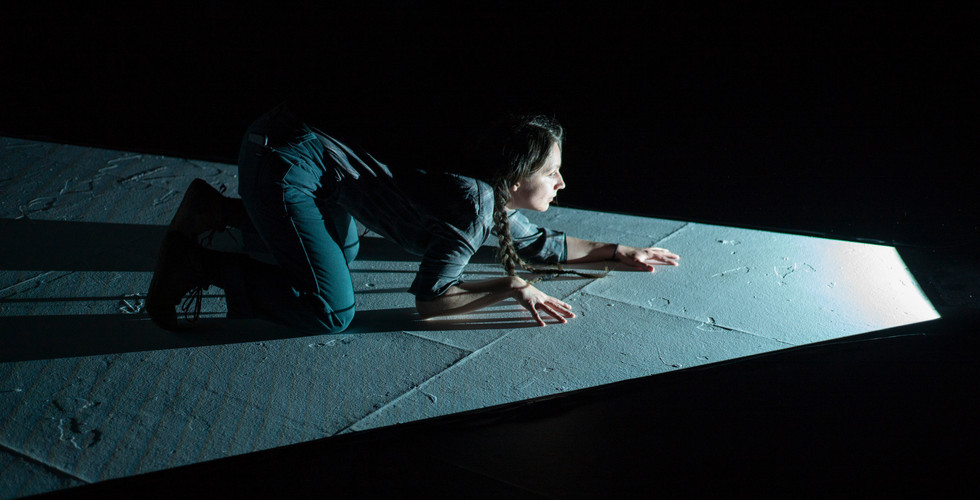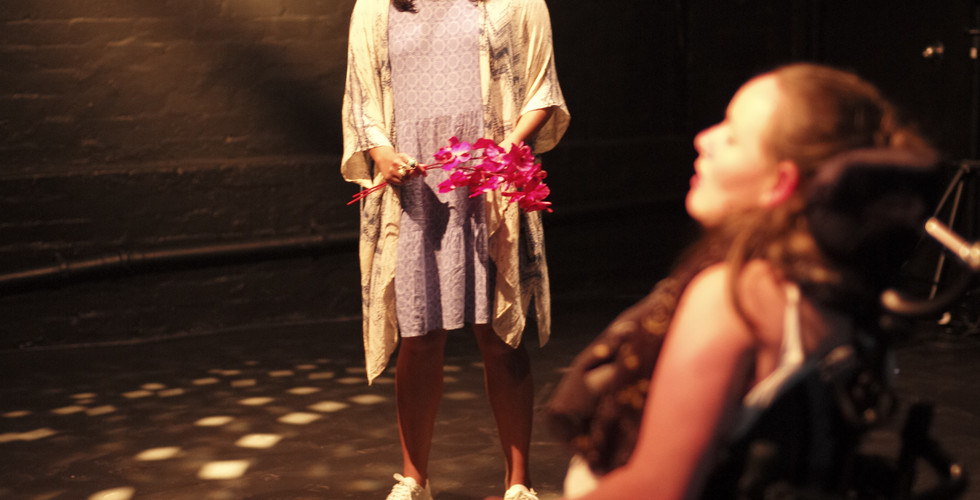BRING YOUR DEVICES IN CASE YOU FORGET and Freefall at PACT
- Aug 17, 2019
- 3 min read
By Laura Heuston
Seated on crates that we positioned ourselves, clumped together in the dark factory space, PACT treated us to two of the three rotating shows in 3x3x2 Festival of New Works, that will be running until August 24. BRING YOUR DEVICES IN CASE YOU FORGET and Freefall are explorations of deep human anxieties- surrounding climate change, death, disability and love- done in very different but both original ways. The brainchildren of those finishing their residency at PACT, it is wonderful to see such original and experimental works being produced by local artists.
BRING YOUR DEVICES IN CASE YOU FORGET is a one woman show by Christie Woodhouse exploring the anxieties of living in the modern climate stricken world. Focusing on the YouTube phenomenon of “prepping” (as in preparing), it consists of a prepping “routine” that is repeated by the actress and on the screen behind her. There is no dialogue until the conclusion, where the more disturbing aspects of the practise are addressed, as well as a potential solution for living a world post-social collapse. The reveal is incredibly effective, however I wonder if this is due to the audience be worn out by the repetitiveness of the majority of piece. It would appear that 20 minutes could have been cut from this hour long composition, and the ending would still have been powerful. The idea of connection is juxtaposed with the silence and ambiguity of the routine, and finally brought home when the audience is addressed personally and genuinely in the final line. This impact seems inherent to the performance, which is truly a credit to the skill of Woodhouse, however I worry about the stamina of audience when engaging with this piece- the repetitiveness means that it could be much more accessible. Nevertheless, I do have the say that the technical aspects of this piece were incredibly well done, combining overlapping voiceovers, projecting live from a phone onto the back wall, and multiple versions of the filmed prepping routine. Woodhouse’s innovation in addressing climate change and social collapse through the lens of prepping, a concept of which we all have a vague but undetailed knowledge, in such a conceptual manner in impressive, and they should be massively proud of their work here.
Freefall is structurally more traditional, however refreshing engages with universal ideas of death, spirituality, sex and love through the lens of incredibly capable people who are differently abled. While not defined by their disabilities, the characters of Emily Dash acknowledge the complications that come about when disability, mental health, strong personalities and sexual differences all intertwine through the death of a loved one. The characters in this piece see the world differently, and ultimately cannot reconcile conflicting worldviews after the trauma of losing someone who could potentially connect them through understanding. Religion is a source of darkness and hope in this play, as is the metaphor of space- we move from being made of stardust to wondering if being ripped apart by a blackhole is the best death fluently.
In terms of the performances, Emily Dash and Alicia Fox lead us through this navigation of complexities, with their heartwarming but ultimately tragic depictions of Carmen and Millie. Carman’s intelligence is palpable, but so is her stubbornness, and when Millie moves more into the realm of the spiritual, Carman cannot, or will not, follow. This inability to communicate is one of the plays sources of conflict, triggered by the early death of their new friend Megan and the bubbling tension caused by Milly’s struggle with Carman’s biromanic asexual identification. These three characters in particular are wonderfully nuanced, as is appropriate for the variety of layers they need to portray. We have less time with the characters of Eleni and Shane, which may explain Dean Nash’s original stiffness, however he does open up in the later scenes.
Fundamentally, both of these works are about connection. The inability of Dash’s characters to understand each other is their undoing, and it is the anxiety of this occurring on a global scale that Woodhouse primarily addresses. These works seek to enable and call for a kinder and more open approach to others, while simultaneously recognising the fear of vulnerability that plagues us all. It is a fear we must overcome it would seem, if we are to be happy, and if we want to survive.
Image Credit; Samuel James
All opinions and thoughts expressed within reviews on Theatre Travels are those of the writer and not of the company at large.








